A gap year is the perfect opportunity to expand your horizons, experience new cultures, stretch your comfort zone, and satisfy curiousities before settling down to study or begin a career. Outward Bound offers many gap year opportunities, in the U.S. and abroad. How to choose?
What’s Your Goal?
Before you jump to a quick decision, take some time to consider what kind of experience you’d like to have for your gap year. What are your goals? What would you like to learn? Are you seeking a cross-cultural experience? What interests would you like to pursue?
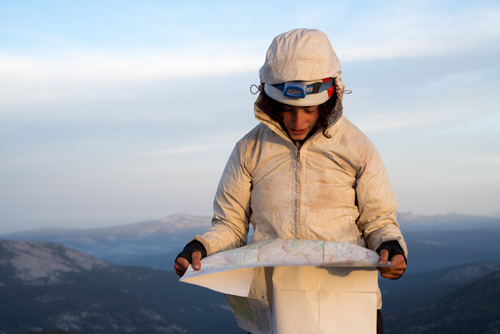
Finding your way with gap year options. Photo by Rikki Dunn
Part of Outward Bound’s tool box is use of the Socratic method, asking questions to stimulate critical thinking and draw out ideas and assumptions. This is a good time to do a little Socratic questioning with yourself, to define your intentions for your gap year. Is time overseas important to you? Do you seek an in-depth wilderness experience, or a specific set of outdoor skills? What else is important to you for your gap year?
If wilderness adventure and personal challenge call you, Outward Bound has a wide range of semester courses to choose from. Some stay in the U.S. while others combine expeditions on our home continent with travel to Ecuador, Brazil, Costa Rica, Bahamas or Patagonia.
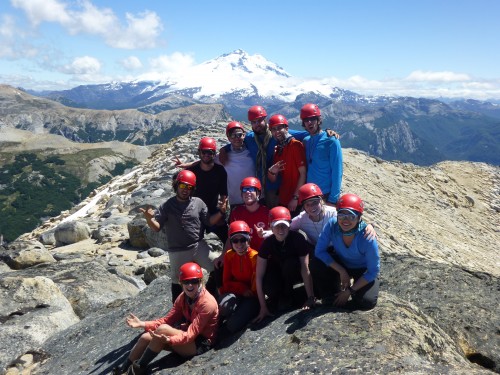
Students soak in the amazing views from the summit in the Andes Mountains.
From Maine to the Colorado Rockies, the Northwest to Florida, semester courses offer the chance to broaden your horizons and learn new skills. Semester courses range in length from 50 to 85 days, and each travels though several different types of wilderness areas.
Stateside or International?
Courses that stay in the U.S. offer more time in grand wilderness areas stateside. Going international with Outward Bound adds the dimension of language and culture, seeing exotic places outside your home country, and how people in other parts of the world live. You’ll still be traveling in wilderness settings, but in addition to your Outward Bound Instructors, you’ll interact with guides, communities and other locals.
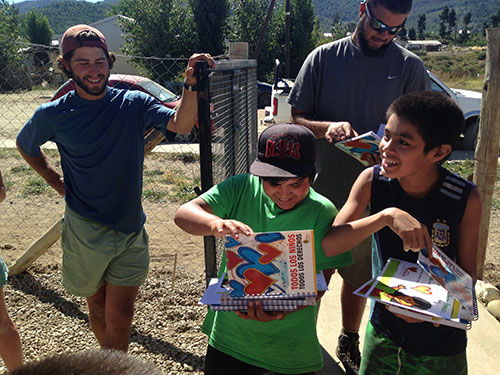
Students complete the service portion of their Outward Bound semester in Patagonia.
While going abroad can seem a bit daunting, you’ll have the benefit of experienced staff who are familiar with the area and culture you travel in. You’ll be “under the wing” of your Instructors and Course Director for this experience, as well as enjoying the continued journey with your group.
Your Outward Bound Instructors work with local experts and communities to ensure safe expeditions, and interesting service projects which offer cross-cultural interactions.
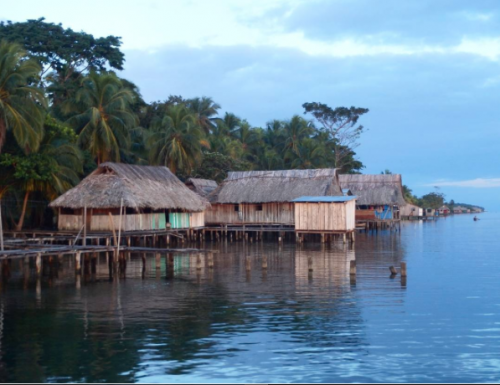
Students spend time living with local indigenous communities when they travel overseas.
One factor to consider if you go international is cost. Airfare is not included in the tuition; it’s an additional expense. With most courses you’ll have the opportunity to remain in the country after the course ends, to extend your cross-cultural experience.
Wondering if you need to know a second language? You aren’t expected to know another language to particiapte on course. It always helps to learn some basics before travel, but fluency is not required. Your Instructors will help with communication, and many people in other countries know a few words of English. Buenos dias! Gracias. You’ll also be surprised how far hand gestures and a smile can take you!
Which Activities?
Have you always wanted to learn to rock climb? Do you love snow and winter? Do you imagine learning to sail? On an Outward Bound Semester course, you’ll have the advantage of diving into several different activities.
For example, on Boundary Waters Dog Sledding and Texas Big Bend Leadership Semester you’ll learn to cross-country ski and run a dogsled in Minnesota in the winter. Then you’ll fly to Big Bend National Park in Texas and experience a totally different environment and activities: desert backpacking, rock climbing and white water canoeing. As your group learns the skills of working together to expedition safely, you’ll take on increasing leadership responsibility, under the guidance of your Instructors. Skills that are new during the first month of the course become practiced and the norm later: decision-making, expedition organization, working out differences, and more, as you become more honed in team skills.
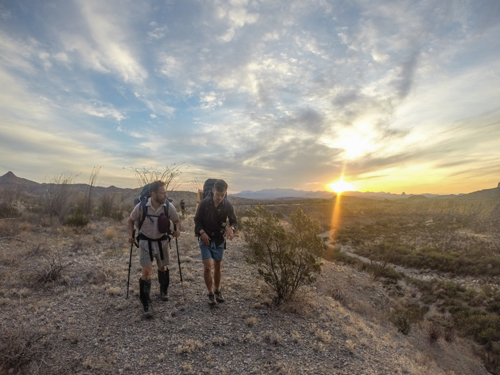
Outward Bound students backpack through Big Bend.
On the Florida Keys to Costa Rica Leadership Semester, you’ll be immersed in water-based wilderness expeditions: sailing and navigation, whitewater river paddling, surfing, and SCUBA. You’ll have the chance to earn a SCUBA certification and experience a range of environments: Florida Keys, Costa Rica’s rivers, and Panama’s beaches and waters.
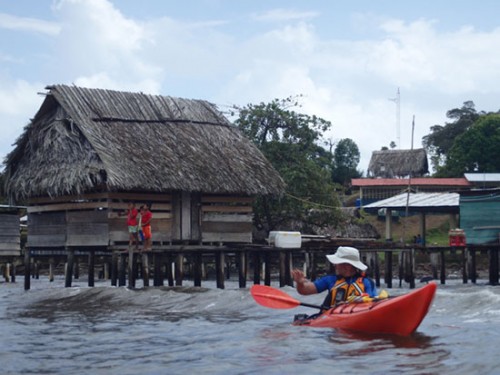
An Outward Bound Gap Year student kayaks overseas during the Florida Keys to Costa Rica Leadership semester.
While these two courses are very different in activities and locations, they demonstrate the range of experience you will have on an Outward Bound Semester gap year course.
The 50-day Southwest Leadership Semester takes place in Utah, taking full advantage of the wide offering of activities there. You’ll find yourself rafting, canyoneering, kayaking, and rock climbing, in a wide range of spectacular wilderness areas, including travel in or near several national parks. You’ll take home a deep sense of the uniqueness of the Southwest. Its rivers, canyons, and plateaus and quiet spirit will become a part of you.
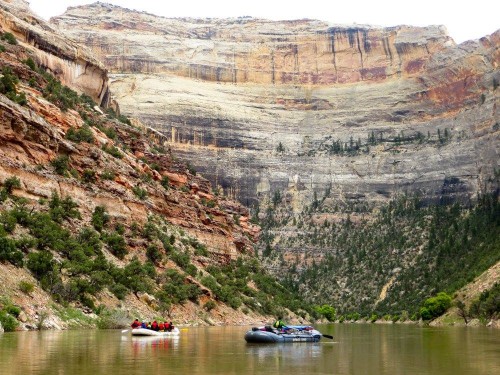
Students rafting through canyons during the Southwest Leadership Semester.
On the Blue Ridge Mountains to Florida and Patagonia course, your group begins in the Blue Ridge Mountains of North Carolina. Here you will learn backpacking, whitewater paddling skills and partake in an in-depth rock climbing experience. The group travels next to the wild rivers of Florida and navigates amid exotic plants and animals by canoe. This 72-day course ends in the pristine and wild region of Patagonia. There, you’ll be immersed in the rural culture. A service project in a local community allows for increased interaction and a chance to give back. While a peak summit attempt puts all the skills you’ve learned thus far to the test.
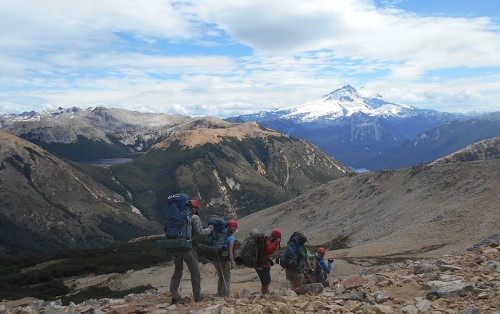
Students backpack through the mountains of Patagonia.
With any Outward Bound Semester course, you’ll develop competency in several wilderness skills, and gain an appreciation of several different types of ecosystems, whatever continent you travel to.
Which Natural Environment?
When you are deciding what course to take, consider the time of year and natural environment that you are drawn to. If you choose somewhere unfamiliar, you’ll find that you stretch your comfort zone, and expand your confidence to adapt to new situations.
Are you drawn to the Rockies and Southwest? The biodiversity of Appalachian forests in Maine or North Carolina? As you look over the range of Outward Bound semester courses available to you, consider where you’d enjoy living in the backcountry.
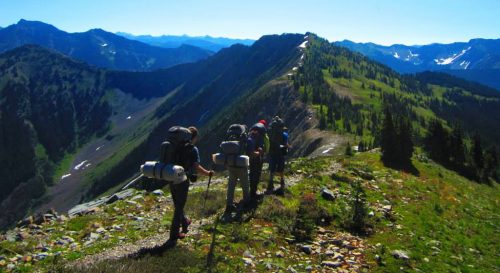
Students explore the North Cascades in the Pacific Northwest. Photo by Erika Halm
So, back to that Socratic questioning. What would you like to accomplish or learn on your gap year? Is an international experience high on your list of priorities? What activities would you like to learn? What natural environment appeals to you? What time of year do you want to be on a course? As you ponder your intention for your gap year, where you’d like to spend it, and what you’d like to learn, you’ll narrow down the options and choose a course that’s the best fit for you.
You might say that staying stateside means going deeper in your wilderness experience, spending more time exploring more wilderness areas in the U.S. Going international offers a broader experience, interacting with new cultures and languages, expeditioning in an exotic place. Both offer skills you will use for the rest of your life, and an unforgettable experience!
Don’t miss out on Early Admissions! We are offering up to $500 off when you enroll on an expedition, now until February 14th. To view courses up to $500 off during Early Admissions, go HERE. To view all of our 2017 expeditions, visit our Course Finder.
To learn more about Outward Bound, visit www.outwardbound.org or call 866.467.7651. With a rich selection of expeditions, a wide variety of age groups, stunning locations, and courses that run throughout the year, there’s an Outward Bound expedition for everyone.
To learn more about what Outward Bound has to offer, sign up for our Newsletter.
About the Author
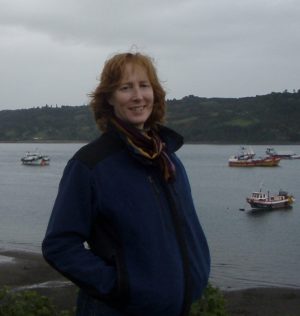
CJ Wilson
CJ Wilson has instructed Outward Bound courses in Maine, North Carolina, Costa Rica, Mexico, and Patagonia. She writes from her base camp in Asheville, N.C.




